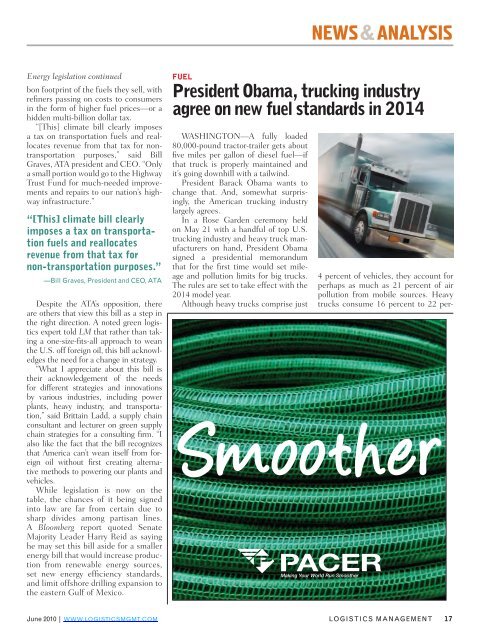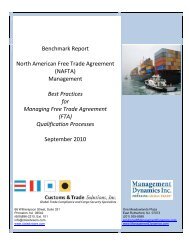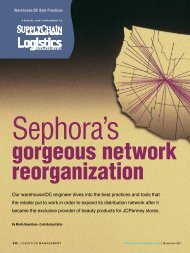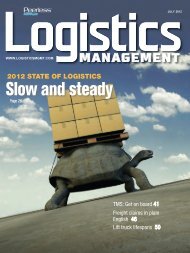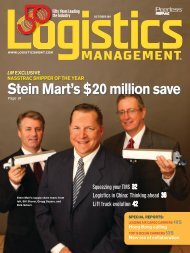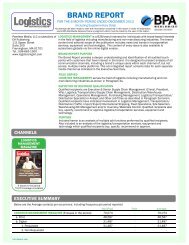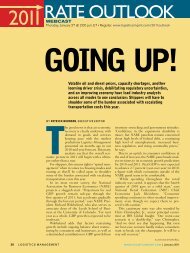Logistics Management - June 2010
Logistics Management - June 2010
Logistics Management - June 2010
You also want an ePaper? Increase the reach of your titles
YUMPU automatically turns print PDFs into web optimized ePapers that Google loves.
Energy legislation continued<br />
bon footprint of the fuels they sell, with<br />
refiners passing on costs to consumers<br />
in the form of higher fuel prices—or a<br />
hidden multi-billion dollar tax.<br />
“[This] climate bill clearly imposes<br />
a tax on transportation fuels and reallocates<br />
revenue from that tax for nontransportation<br />
purposes,” said Bill<br />
Graves, ATA president and CEO. “Only<br />
a small portion would go to the Highway<br />
Trust Fund for much-needed improvements<br />
and repairs to our nation’s highway<br />
infrastructure.”<br />
“[This] climate bill clearly<br />
imposes a tax on transportation<br />
fuels and reallocates<br />
revenue from that tax for<br />
non-transportation purposes.”<br />
—Bill Graves, President and CEO, ATA<br />
Despite the ATA’s opposition, there<br />
are others that view this bill as a step in<br />
the right direction. A noted green logistics<br />
expert told LM that rather than taking<br />
a one-size-fits-all approach to wean<br />
the U.S. off foreign oil, this bill acknowledges<br />
the need for a change in strategy.<br />
“What I appreciate about this bill is<br />
their acknowledgement of the needs<br />
for different strategies and innovations<br />
by various industries, including power<br />
plants, heavy industry, and transportation,”<br />
said Brittain Ladd, a supply chain<br />
consultant and lecturer on green supply<br />
chain strategies for a consulting firm. “I<br />
also like the fact that the bill recognizes<br />
that America can’t wean itself from foreign<br />
oil without first creating alternative<br />
methods to powering our plants and<br />
vehicles.<br />
While legislation is now on the<br />
table, the chances of it being signed<br />
into law are far from certain due to<br />
sharp divides among partisan lines.<br />
A Bloomberg report quoted Senate<br />
Majority Leader Harry Reid as saying<br />
he may set this bill aside for a smaller<br />
energy bill that would increase production<br />
from renewable energy sources,<br />
set new energy efficiency standards,<br />
and limit offshore drilling expansion to<br />
the eastern Gulf of Mexico.<br />
FUEL<br />
President Obama, trucking industry<br />
agree on new fuel standards in 2014<br />
WASHINGTON—A fully loaded<br />
80,000-pound tractor-trailer gets about<br />
five miles per gallon of diesel fuel—if<br />
that truck is properly maintained and<br />
it’s going downhill with a tailwind.<br />
President Barack Obama wants to<br />
change that. And, somewhat surprisingly,<br />
the American trucking industry<br />
largely agrees.<br />
In a Rose Garden ceremony held<br />
on May 21 with a handful of top U.S.<br />
trucking industry and heavy truck manufacturers<br />
on hand, President Obama<br />
signed a presidential memorandum<br />
that for the first time would set mileage<br />
and pollution limits for big trucks.<br />
The rules are set to take effect with the<br />
2014 model year.<br />
Although heavy trucks comprise just<br />
4 percent of vehicles, they account for<br />
perhaps as much as 21 percent of air<br />
pollution from mobile sources. Heavy<br />
trucks consume 16 percent to 22 per-<br />
<strong>June</strong> <strong>2010</strong> | WWW.LOGISTICSMGMT.COM PACEGNL00320 small space_v5_LM.indd 1<br />
<strong>Logistics</strong> ManAGEMEnt 5/19/10 4:40:48 17PM


